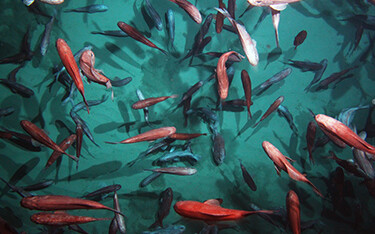Emma Desrochers is a freelance journalist based in Waialua, Hawaii, who writes about fisheries and sustainability. She graduated from Yale University in June 2021 with an undergraduate degree in environmental studies and mechanical engineering. She has contributed to the environmental conservation field through internships located in Ecuador, Thailand, and Hawaii.
Author Archive
Three of New Zealand’s largest orange roughy fisheries have achieved the Marine Stewardship Council (MSC) standard recertification. These fisheries represent approximately 73 percent of New Zealand’s orange roughy harvests and were the first orange roughy fisheries to be certified as sustainable to the MSC fisheries standard in 2016.
The owners of quota for New Zealand’s deep-water fisheries are represented by The Deepwater
… Read MoreThe red rock lobster fishery in Baja, Mexico has received its third Marine Stewardship Council (MSC) standard recertification since becoming one of the first 10 fisheries in the world to obtain MSC certification in 2004.
The fishery is overseen by the Regional Federation of Cooperative Societies of the Fishing Industry of Baja California (FEDECOOP), which acts as a client and integrates 14 cooperatives together, nine of which are MSC-certified.
… Read MoreCharoen Pokphand Foods PCL (CP Foods) announced progress to reduce use of antibiotics in aquaculture along with other sustainability efforts as part of the Seafood Business for Ocean Stewardship (SeaBOS) initiative. SeaBOS is a group of ten of the largest global seafood companies working towards more sustainable seafood production and improved ocean health.
As part of SeaBOS’s collaboration, several task forces were created to focus
… Read MoreThe Fisheries Transparency Initiative (FiTI) has laid out a case against ranking fisheries transparency efforts in a global fisheries transparency index.
FiTI is a global multi-stakeholder partnership focused on increasing transparency and collaboration in marine fisheries management. It is working with governments of coastal nations around the world to produce country reports that provide a deep dive into the state of the
… Read MoreThe Pacific whiting (hake) mid-water trawl fishery is the first fishery outside of Alaska to achieve Responsible Fisheries Management (RFM) certification. The fishery covers federal waters off the U.S. states of Washington, Oregon, and California.
The Pacific whiting fishery is now eligible to sell products harvested from 10 January, 2022, forward with the RFM eco-label. The RFM certification process was initiatived by the Pacific Whiting
… Read MoreSeafood Business for Ocean Stewardship (SeaBOS) has released its first progress report since its launch in 2016, detailing its efforts to improve the sustainability of the seafood industry.
SeaBOS is a collaboration of 10 of the world’s largest seafood companies across the wild capture, aquaculture, and aquafeed production sectors.
The companies involved in SeaBOS are Maruha Nichiro, Nissui, Thai Union, Mowi, Dongwon Industries,
… Read MoreFive founding members of TUNACONS have achieved Marine Stewardship Council (MSC) certification for yellowfin tuna products caught in the Eastern Pacific Ocean.
The Ecuadorian companies involved in the initiative are Negocios Industriales Real NIRSA S.A., Servigrup, and Eurofish, along with Panamanian firm Pesquera Jadran and U.S.-based Tri Marine. The certification covers 47 vessels between the companies and is the first certification for
… Read MoreThe Global Seafood Alliance (GSA) has published an update of the Responsible Fishing Vessel Standard (RFVS).
The RFVS is part of GSA’s Best Seafood Practices (BSP) certification program, which uses third-party certification to link responsible wild fisheries to certified vessels and processing plants.
The new RFVS Issue 2.0 replaces the previous Issue 1.1 in order to incorporate lessons learned and feedback by industry partners,
… Read MoreHuman Rights at Sea (HRAS) and the WWF have raised joint concerns about ongoing legal and human rights challenges through a joint letter to the Western and Central Pacific Fisheries Commission (WCPFC).
The two groups said they aim to ensure there is specific language protecting human and labor rights in the regional fishery management organization's fisheries conservation and management measures (CMMs).
CMMs are binding decisions about
… Read MoreThe deadline to implement the GlobalG.A.P. chain of custody (CoC) standard throughout supply chains is 31 December, 2023, as starting on 1 January, 2023, all parties that handle loose, unpacked products originating from GlobalG.A.P.-certified production processes must have a valid CoC certification in order to maintain the certification's validity through the sale of those products.
GlobalG.A.P.'s aquaculture certification
… Read More















